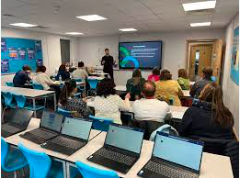In today’s fast-moving academic and professional environments, feedback plays a crucial role in helping individuals learn, adapt, and thrive. Whether you’re a student, teacher, or working professional, knowing how to use feedback constructively can fuel your personal and career development. In 2025, the ability to turn feedback into meaningful growth has become more essential than ever.
Understanding the Purpose of Feedback
Feedback is not criticism—it’s an opportunity. When delivered constructively, it provides insights into what is working and what might need improvement. In classrooms, feedback helps students refine their study techniques. In the workplace, it fosters performance improvement and clearer communication. Recognizing feedback as a tool rather than a judgment is the first step toward turning it into growth.
Adopt a Growth Mindset
A growth mindset allows individuals to view challenges and corrections as pathways to improvement. When receiving feedback in 2025’s dynamic learning or work environments, embrace it as a guide rather than a setback. Ask yourself: What can I learn from this? This mindset encourages resilience and continuous progress.
Listen Actively and Objectively
Active listening means fully concentrating on what’s being shared without interrupting or defending. It also involves interpreting tone, intent, and specific suggestions. In digital feedback formats—common in online education and remote work—take time to reread the comments and ask clarifying questions if needed. Stay objective and avoid taking feedback personally.
Reflect Before Reacting
Instead of reacting emotionally, give yourself a moment to reflect. Think about the feedback’s intention and how it relates to your goals. If someone points out an area of improvement, consider how making a change could enhance your overall performance or skills. Reflective practice helps you grow from each experience.
Create an Action Plan
Feedback becomes transformative when it leads to action. Identify key areas to work on and set achievable goals. For instance, if a teacher notes that your essay lacks clarity, you might commit to reviewing writing strategies or using writing assistance tools. Break larger goals into small, measurable steps that you can track over time.
Ask for Feedback Regularly
Growth in 2025 is closely tied to collaboration and communication. Seek feedback consistently rather than waiting for formal evaluations. Whether from peers, mentors, or supervisors, regular input can offer new perspectives and prevent small issues from becoming larger obstacles. It also demonstrates your willingness to improve.
Support Others in Their Growth
Giving thoughtful feedback to others is just as important as receiving it. In learning or professional settings, aim to provide feedback that is respectful, specific, and solution-oriented. Encouraging others helps build a positive environment where growth is a shared goal.
Celebrate Progress
As you apply feedback and improve, take time to recognize your achievements. Even small improvements matter. Celebrating growth fosters motivation and reinforces a proactive approach to learning and development.
Conclusion
Feedback is a powerful tool when used wisely. In 2025, success in both academic and career settings depends on the ability to accept, interpret, and act on feedback. By maintaining a growth mindset, listening actively, creating actionable goals, and continuously seeking improvement, you can transform feedback into one of your greatest assets for lifelong growth.














